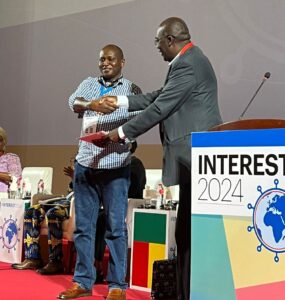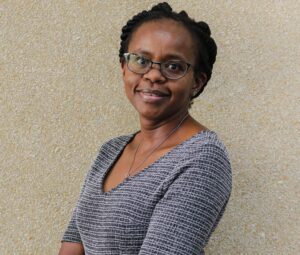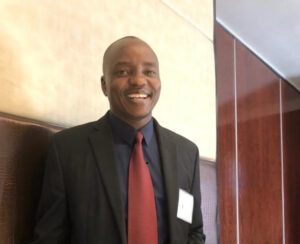Developing Excellence in Leadership, Training and Science (DELTAS) Africa supports an African-led research capacity strengthening program geared towards nurturing world-class researchers and scientific leaders. As we celebrate CARTA’s milestones over a decade, #CARTA10, we spoke to Dr. Alphonsus Neba, Deputy Programs Director – Science Support and Systems, The Africa Academy of Sciences (AAS) to get insights on gender equity in doctoral research in Africa.
By Florence Sipalla, Communications Manager
- Why is it important to promote gender equity, especially as we nurture the next cadre of research leaders on the African continent?
Nurturing the next cadre of research leaders on the African continent is one of the interventions that would lead to invaluable health and socio-economic outcomes and benefits for future generations of Africans, especially in terms of quality of life for millions for Africans. This new crop of leaders holds a lot of promise for real change in many areas of the research profession as they represent a generational and a paradigm shift from the club of aging academics and professors and the tradition where today’s understanding, agitation and efforts at addressing gender challenges are uncomfortable and near taboo issues. Ignoring gender equity in this laudable intervention would inevitably lead to missed opportunities to build a new and vibrant gender equity culture in research, driven by a new crop of younger research leaders which would maximize the benefits for Africa’s burgeoning population. The participation and thriving of women and other marginalized groups of people in finding solutions to health challenges undoubtedly brings in multiple perspectives, views and a wider spectrum of potential solutions.
- How are African universities and research institutions doing with regards to gender equity in doctoral research programs?
African universities and research institutions have shown some level of interest in strengthening gender equity in doctoral research programs, as well as mainstreaming this concept into their core functions of teaching and research and administration. This explains why many have introduced gender courses in various faculties and departments.
However, it appears there has been little concerted effort, synchronized policy and plan for integrating gender into university and other research institutions functions as whole, and specifically within doctoral research programs. What is required is a fundamental shift to more holistic gender responsive strategies and a move beyond simply enabling access to universities and research institutions and postdoctoral research programs to effectively address the issues that predominantly affect women and other marginalized group’s ability to fully participate and optimally perform within these institutions and postdoctoral programs in Africa.
- What are the gender-related differential challenges that are encountered by researchers, thus making it difficult for them to progress in their careers?
I have often marveled at how young early career female researchers combine marriage life, childbearing, homecare, and minding after kids and even spouses, some of whom are scientists themselves, and still excel in their research careers, oftentimes outshining their male counterparts. In worst case scenarios, some must simultaneously contend with other challenges including various forms of harassment, bullying and intimidation at their respective places of work.
In one of the DELTAS African Programs Annual Scientific Conferences in Cote DÍvoire in 2019, the Alliance for Accelerating Excellence in Science in Africa (AESA) provided funding to cover expenses for female DELTAS Fellows and their young infants and childcare support for the duration of the conference. This was to ensure they did not miss the conference on account of having minor children and to enable them to participate fully at the conference or so we thought.
Even with this level of support, the female fellows spent an inordinate amount of time dividing attention between conference proceedings and tending to the welfare of their infants and the child minders. While all this happened, their male counterparts were less distracted and fully participating in the various conference sessions, quite oblivious to this gender-related differential challenge encountered by their female peers. It takes an extra-ordinarily high level of tenacity and determination by female scientists to overcome gender-related differential challenges, despite the best efforts and support systems that may sometimes be provided. There is a need for universities and research institutions and all stakeholders in postdoctoral training programs in Africa to be deeply sensitive to the challenges of gender equality especially within the contextual realities of unique African societies and cultural norms.
- How has the Developing Excellence in Leadership, Training and Science (DELTAS) program embraced gender mainstreaming?
At the onset of the DELTAS Africa Initiative, we recognized gender-related differential challenges as a major risk factor to what we sought to achieve and moved quickly to develop, implement and promote gender friendly policies for the programme. We also took deliberate actions to provide budget lines for the implementation of the various policies, including training and raising awareness among our grantees. While this was mostly programme-based, we have since recruited a Gender Specialist to assist the AAS and AESA platform conduct a landscape study and develop a Gender, Equity, Diversity and Inclusive (GEDI) strategy and an implementation plan which would guide us as we address current gaps and fully mainstream gender and related issues within and across all our programs, business operations and activities. We have actively encouraged our grantees and their institutions to embrace issues of gender, equity, diversity and inclusion.
- What can other research capacity strengthening programs, especially on the African continent, learn from the DELTAS experience?
The DELTAS Africa experience has been a pacesetter in many aspects of health research leadership capacity development on the continent. We make no apologies for being an Africa-led research capacity development program, with the most eminent African research leaders and scientists taking the lead in developing a critical mass of globally competitive research leaders, within state-of-the art research environments and a new culture of doing research that we actively support and promote. One of the central pillars of this success is recognizing and addressing issues around gender and diversity and being bold enough to adopt and introduce innovative interventions where necessary. We have found that developing functional and effective program management systems, policies and procedures, backed by robust finance and grants governance systems and structures, functional monitoring, evaluation and learning systems, robust programme risk management and mitigation frameworks, and maintaining collaborative and mutually respectful relationships with our grantees, and other stakeholders is a recipe for success.
Overall DELTAS Africa Gender Ratio as at Dec 2019 (this includes all categories of trainees recruited to date i.e. interns, MSc, PhDs, Post doc, Senior Research fellows)
- From MSC to PhD to Postdoc Level:
- Male: 437 Female: 401
- At MSc Level Male: 200 Female: 179
- At PhD Level Male: 156 Female: 163
- At Postdoctoral Level Male: 73 Female: 57
- Parting shot?
As gender issues gain more currency, a combination of innovative institutional and intellectual strategies would be required to advance gender equity, and to equip institutions and postdoctoral programs to continue to respond and to keep abreast developments in the gender equity discourse. With visionary research leadership, and a culture of research excellence, the journey towards addressing gender equity issues within research institutions and postdoctoral training programs would progress much faster.




